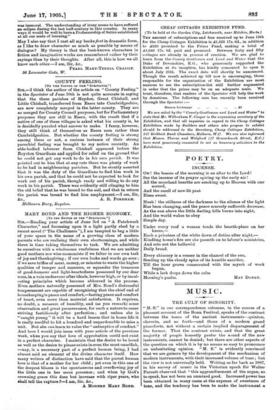SIR,—Reading your article of June 3rd on "A Patchwork Character,"
and focussing upon it a light partly shed by a recent novel (" The Challoners "), I am tempted to beg a little of your space in the name of a growing class of modern parents who are realising their own shortcomings, and while there is time taking themselves to task. We are admitting to ourselves with a wholesome ruefulness that we are neither good mothers nor wise economists if we falter in our own task of joy and thanksgiving ; if our own looks and words go sour ; if we save trifles of meat, money, or minutes to waste the higher qualities of temper and manners, or squander the treasures of good-humour and light-heartedness possessed by our dear ones, in a vain endeavour after ideals, however high, or by incul- cating principles which become abhorred in the process. Even mothers naturally possessed of Mrs. Bond's distressful temperament are capable of recognising that the chief end of housekeeping is peace and comfort,—lasting peace and comfort of heart, even more than material satisfaction. It requires, no doubt, a measure of humility, and (as you remark) some observation and great perseverance, for such a nature to cease striving fastidiously after perfection ; and unless she is " caught young " it will be a hard lesson that in home life it is really needful to hit a hundred and unpardonable to miss a unit. But she can learn to value the " antiseptics of conduct." And here I would join issue with your article of the previous week, when you say that love of approbation could not exist in a perfect character. I maintain that the desire to be loved as well as the desire to please exists in even the most unselfish, —nay, is a necessary part of a perfect human being, I had almost said an element of the divine character itself. How many writers of distinction have said that the purest human love is that of a mother for her child ; yet even in this one of the deepest blisses is the spontaneous and overflowing joy of the little one in her mere presence ; and when by God's crowning grace this does but increase with riper years, who shall tell the rapture P—I am, Sir, &c.,
A MODERN MARY BOND.






































 Previous page
Previous page